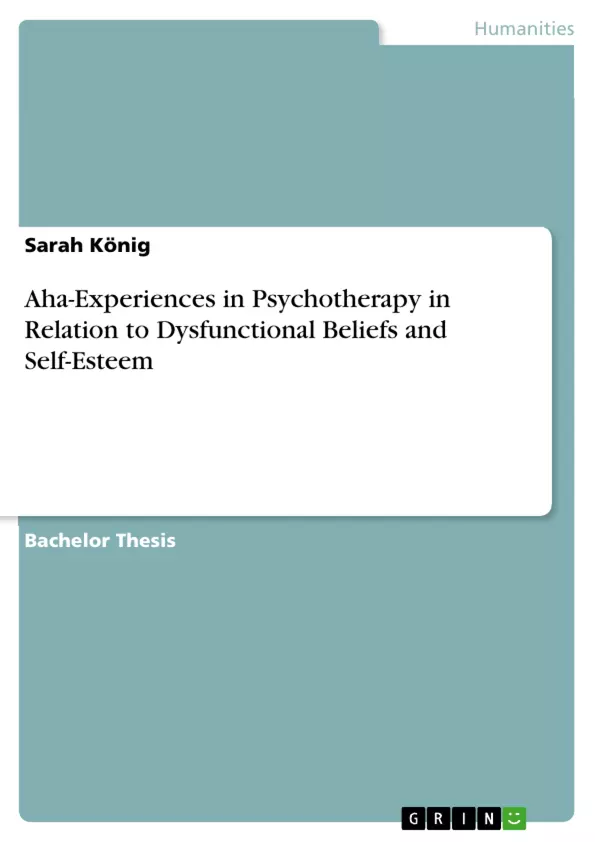This study is part of a pioneering project examining aha-experiences regarding dysfunctional beliefs using the Rethink-paradigm designed for this purpose. Findings stemming from problem-solving research lead to consider aha-experiences as beneficial for motivational clarification, a working mechanism of psychotherapeutic change.
The present study examines interactions of implicit self-esteem and therapeutically relevant aha-experiences in participants that have no history of psychological disorders. Lower self-esteem was shown to be associated with experiencing more aha-moments regarding dysfunctional beliefs but this moderate effect fell short of becoming significant. A small, non-significant effect was found for the number of aha-experiences being associated with a decline in self-esteem.
Given the limitations of the present study, future research should be carried out to satisfactorily answer the question of how aha-experiences influence implicit self-esteem and to examine whether aha-experiences are superior to other clarification processes in bringing about therapeutic change.
Inhaltsverzeichnis (Table of Contents)
- 1. Introduction
- 1.1. Theoretical Background
- 1.1.1. Grawe's Universal Working Mechanisms of Psychotherapy
- 1.1.2. Dysfunctional Beliefs
- 1.1.3. The Aha-Experience
- 1.1.4. Self-Esteem
- 1.2. Aim of the Present Study
- 1.3. Research Questions
- 1.3.1. Influence of Implicit Self-Esteem on Aha-Experiences
- 1.3.2. Influence of Aha-Experiences on Implicit Self-Esteem
- 2. Method
- 2.1. Participants
- 2.2. Rethink-Paradigm
- 2.2.1. Stimulus Selection
- 2.2.2. Procedure
- 2.3. Implicit Association Test
- 2.4. General Procedure
- 2.5. Statistical Tests
- 3. Results
- 3.1. Descriptive Values
- 3.2. Hypothesis 1
- 3.3. Hypothesis 2
- 4. Discussion
- 4.1. Interpretation of Results
- 4.2. Limitations and Implications for Research and Practice
Zielsetzung und Themenschwerpunkte (Objectives and Key Themes)
This study aims to investigate the relationship between aha-experiences and implicit self-esteem in the context of psychotherapy. The study specifically focuses on the influence of implicit self-esteem on the occurrence of aha-experiences and vice versa.
- The role of aha-experiences in psychotherapy
- The influence of dysfunctional beliefs on aha-experiences
- The relationship between aha-experiences and implicit self-esteem
- The application of the Rethink-Paradigm and the Implicit Association Test (IAT) in measuring aha-experiences and self-esteem
- The implications of the study for research and practice in psychotherapy
Zusammenfassung der Kapitel (Chapter Summaries)
Chapter 1 provides a comprehensive overview of the theoretical background, outlining the concepts of Grawe's Universal Working Mechanisms of Psychotherapy, dysfunctional beliefs, aha-experiences, and self-esteem. It also clarifies the study's aim and research questions. Chapter 2 details the methodology employed, describing the participant selection, the Rethink-Paradigm, the Implicit Association Test, the general procedure, and the statistical tests utilized. Chapter 3 presents the results of the study, including descriptive values and the findings related to the research hypotheses. Chapter 4 offers an interpretation of the results, discussing the limitations and implications for research and practice.
Schlüsselwörter (Keywords)
Aha-experiences, psychotherapy, dysfunctional beliefs, implicit self-esteem, Rethink-Paradigm, Implicit Association Test, research methodology, statistical analysis.
Frequently Asked Questions
What are aha-experiences in psychotherapy?
Aha-experiences are sudden moments of insight that are considered beneficial for motivational clarification, a key mechanism for change in psychotherapeutic treatment.
How does implicit self-esteem influence aha-experiences?
The study showed that lower self-esteem is associated with experiencing more aha-moments regarding dysfunctional beliefs, although this effect was moderate and not statistically significant.
What is the Rethink-Paradigm?
The Rethink-Paradigm is a research design specifically developed to examine aha-experiences related to dysfunctional beliefs in a controlled setting.
What is the role of the Implicit Association Test (IAT) in this study?
The IAT was used as a methodology to measure the implicit self-esteem of the participants in relation to their therapeutic progress.
Do aha-experiences lead to a decline in self-esteem?
A small, non-significant effect was found suggesting that a higher number of aha-experiences might be associated with a decline in self-esteem, but further research is needed.
- Arbeit zitieren
- Sarah König (Autor:in), 2016, Aha-Experiences in Psychotherapy in Relation to Dysfunctional Beliefs and Self-Esteem, München, GRIN Verlag, https://www.grin.com/document/353116



